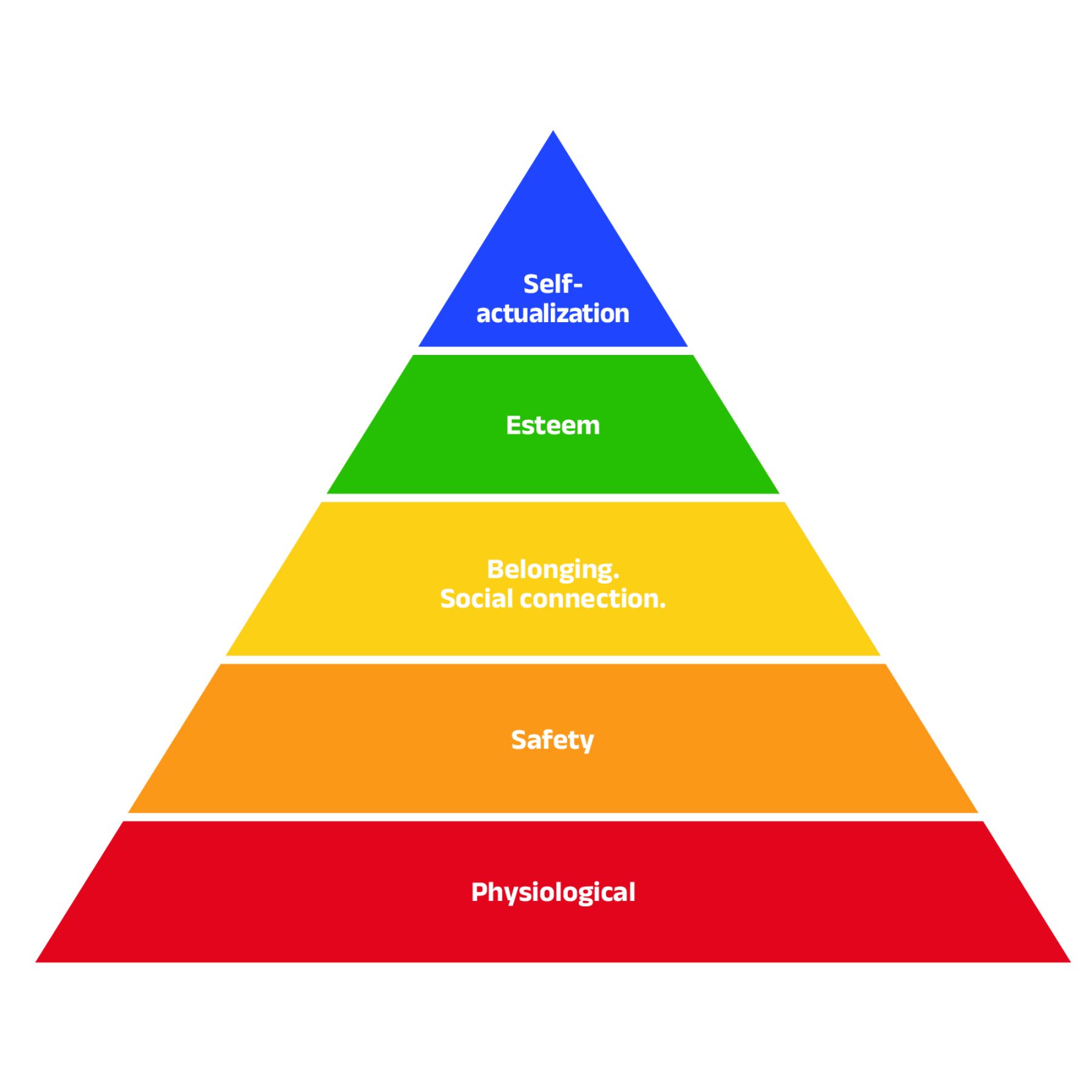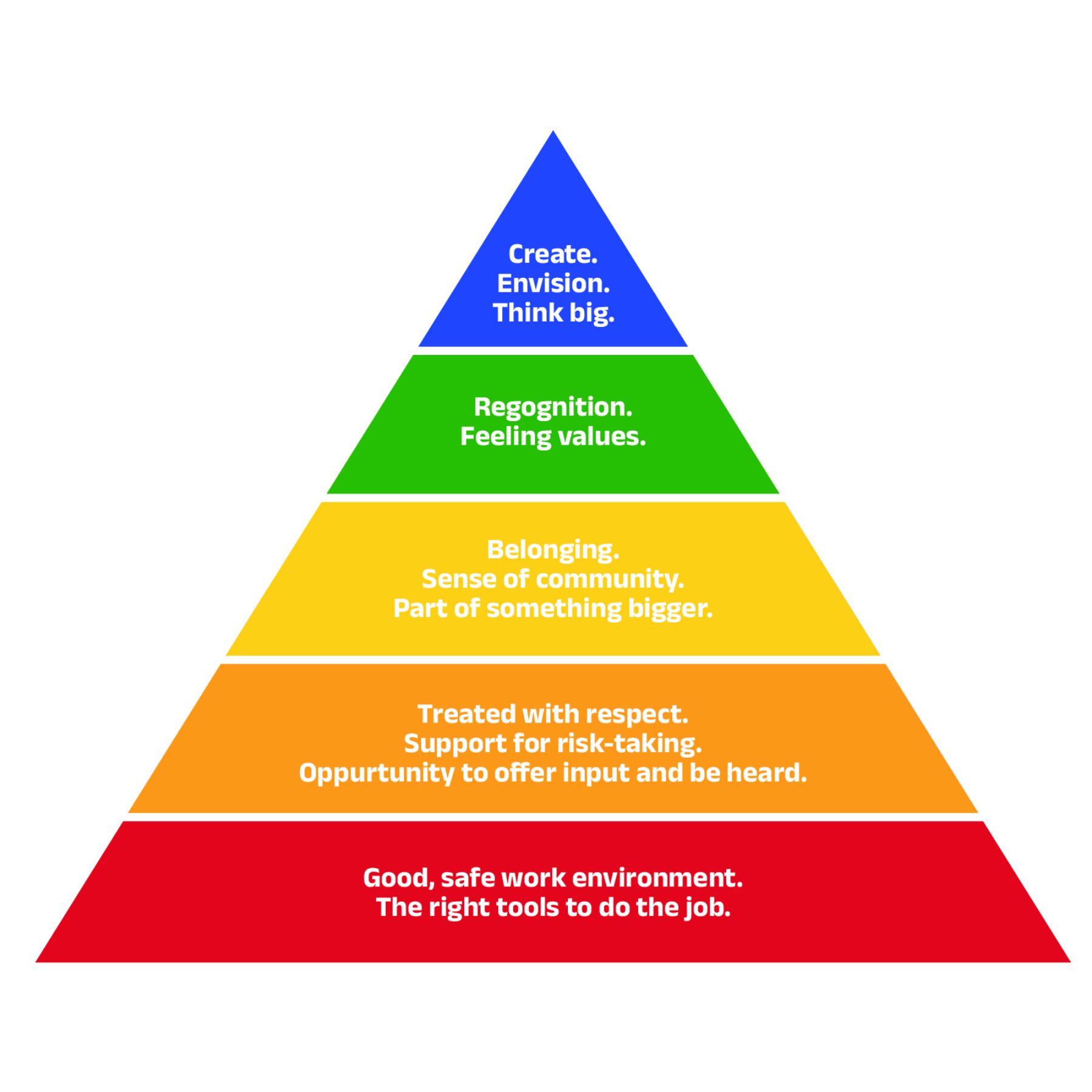
By Philip Levy, Ph.D., Suzy Jurist, CEO SJI Associates
Every business wants their employees to think big, work hard, be inspired, and even be inspirational. So what do they need to do their best? Psychologist Abraham Maslow may have provided a blueprint.
Maslow developed a psychological theory of human motivation, proposing that for high-level motivation or self-actualization to occur, more fundamental needs must first be addressed. Maslow’s five-tier hierarchal model starts with basic physiological needs, safety, and belonging, then progresses to self-esteem and self-actualization.

Before individuals can reach their full potential, their physiological needs (nourishment, health), safety needs (shelter, stability), and social needs (friendship, belonging), must be addressed.
These same principles apply to business. For employees to grow and reach their fullest potential, their basic needs must be prioritized.
We can apply Maslow’s Hierarchy of Needs to show how employees can be supported to reach the highest levels of self-actualization—enabling businesses to achieve excellence and financial success.
Business Application of Maslow’s Hierarchy

Maslow’s Need: PHYSIOLOGICAL
Business Application: Safe work environment. Proper lighting. Clean facilities. Airflow. Heat. The correct tools to do the best job.
Example: Google has bicycles and electric cars to get staff to meetings, gaming centers, organic gardens, and eco-friendly furnishings. The company wants to make its employees’ lives more comfortable, and they are continually searching for ways to improve the health, well-being, and morale of its Googlers.
Maslow’s Need: SAFETY
Business Application: Treat coworkers with respect. Allow them the freedom to take risks and not be harshly criticized or humiliated.
Example: The fact that the CEO of Facebook, one of the world’s most dynamic and fastest growing companies, is meeting with entry-level employees says a lot about the way Mark Zuckerberg does business. Rather than slotting people into roles based on age and experience, Facebook values everyone’s ideas in clear and distinct ways.
Maslow’s need: BELONGING
Business Application: Give everyone the opportunity to be heard. Create a sense of community. Coworkers are part of something bigger than themselves. They have a clear understanding of a value-centered mission.
Example: HBO’s Corporate Social Responsibility team unites HBO employees, talent and non-profit partners to make a difference on social issues, connected to their industry, and their communities. Employees are inspired from their top-down leadership to educate, take action and help make the world a better place.
Maslow’s need: ESTEEM
Business Application: Empowerment. Public praise. Employee recognition programs. Understanding that each person’s job contributes to the ultimate success of the company. Making everyone feel valued and important.
Example: Southwest gives employees “permission” to go the extra mile to make customers happy, empowering them to do whatever is necessary to meet that vision.
Maslow’s need: SELF-ACTUALIZATION
Business Application: Give employees the opportunity to think big, to be creative, to have a vision for the future, to reinvent, and provide direct input to senior leadership.
Example: Google offers its employees one of the most innovative work environments. The company cares so much about innovation that it has set forth nine principles of innovation. One of their tenets encourages Google employees to spend 20% of their time pursuing innovative ideas about which they are passionate—resulting in products and applications like Google News, Google Alerts and Google Maps Street View.
Maslow’s model is a reminder that leaders and their businesses are served best when they look at the world with an “outward mindset,” from the perspective of their stakeholders—demonstrating authentic empathy, concern, and compassion, while establishing, articulating, and modeling clear and measurable values, standards and expectations. An effort to understand the physiological, safety, belonging, and esteem needs of those stakeholders is essential to creating an environment where people are trusted and supported in their pursuit of excellence.
Establishing a model of “participatory management,” where employees are involved in the decision-making process, where their input is sought and valued. When they feel like they are as important as what they do, it will result in the true dedication that all leaders need to maximize their company’s performance. Leaders always espouse a desire for teamwork, but they often forget their own role in establishing a collaborative team feeling that drives performance and results. They need to recognize and respond proactively to the physiological, safety, belonging and esteem needs of their stakeholders.
The best companies create workforces treated with respect and dignity, where each person feels heard and empowered, where everyone understands their role and how it contributes to something bigger than themselves, where there is no fear of taking risks, and where there is a feeling of ownership. Working to satisfy these needs helps empower people to become their best selves and enables businesses and brands to excel.
About the Authors
Suzy Jurist is the president of SJI, an NYC-based woman-owned strategic creative agency. From Fortune 500 companies to non-profits, to start-ups, SJI helps brands build and strengthen connections with their audiences. Contact: suzy@sjiassociates.com
Dr. Philip Levy is the Founder and President of PHL HP Consulting Group, a boutique management consulting and leadership development company dedicated to building and sustaining high-performing companies and their leaders. He is also an Executive Coach, a private psychotherapist, and Managing Director of C2C, a Peer-to-Peer Mentoring Group for C-Level executives. Contact: Philip@phlconsultinggroup.com. www.phlconsultinggroup.com